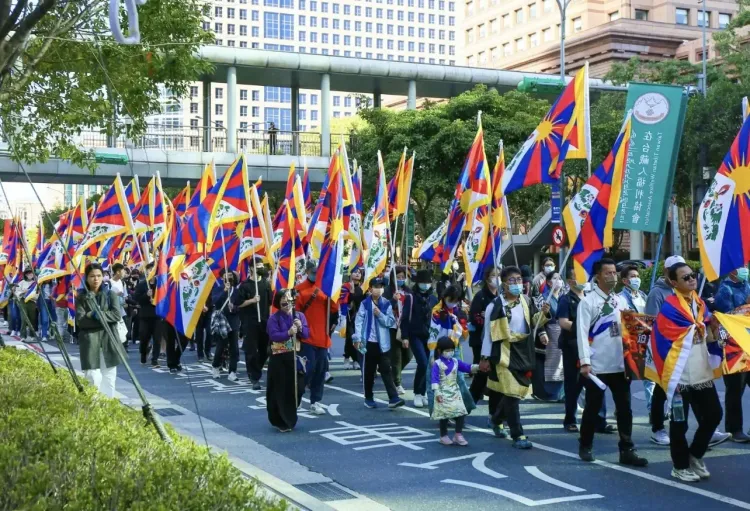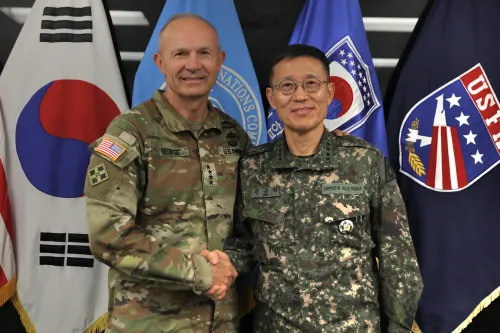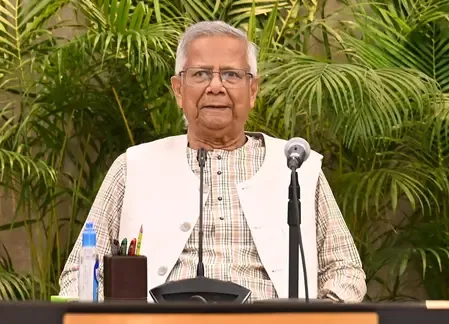Thousands Gather in Taiwan to Honor Tibetan Uprising Day

Synopsis
Key Takeaways
- Thousands marched in Taipei for Tibetan Uprising Day.
- Focus on human rights violations by the CCP in Tibet.
- First participation of Taiwan's NHRC in this event.
- Theme of the march: “Tibet has never been part of China.”
- Historical context of the 1951 invasion and consequences.
Taipei, March 10 (NationPress) Thousands of individuals participated in a march in Taipei over the weekend to observe the 66th anniversary of the Tibetan Uprising Day on Monday, paying tribute to those who fought against the Chinese Communist Party's regime.
Demonstrators honored those who lost their lives during the Tibetan uprising, voicing their opposition to the CCP's cultural and ethnic genocide in Tibet, as reported by Taiwan’s prominent newspaper, Taipei Times.
Members of Taiwan's National Human Rights Commission (NHRC) joined the march, marking the first time the commission has participated in this annual event.
During the event, Vice Chairperson Wang Yu-ling stated that the issues concerning Tibet are fundamentally about human rights, emphasizing that the CCP invaded and occupied Tibet under the guise of a peace agreement, while systematically destroying Tibetan culture and religion.
“Human rights transcend borders; they are a universal value, and today’s Tibet could foreshadow Taiwan’s future,” she remarked, according to local media.
Kelsang Gyaltsen Bawa, representing the Tibetan government in exile in Taiwan, was present and highlighted that this year’s march theme was “Tibet has never been part of China.”
He elaborated that in 1951, the CCP used coercion to force Tibet into signing the Seventeen-Point Agreement, misleadingly termed the “Agreement on Measures for the Peaceful Liberation of Tibet,” only to occupy the region, resulting in the deaths of over 1.2 million Tibetans.
Bawa characterized the so-called “peace agreement” as deceitful, noting that in the same year it was signed, Chinese military forces took control of Tibet, violating the agreement that assured Tibetans their right to self-governance, as per the Taipei Times.
On March 10, 1959, approximately 10,000 Tibetans congregated in Lhasa to protest against the tightening grip of China, but the uprising faced brutal suppression, leading the Dalai Lama to flee to India, with around 150,000 Tibetans following him into exile.
Bawa also stated that this annual gathering, held in Taipei since 2004, serves as a reminder for both the people of Taiwan and the international community to never forget the atrocities committed by China in Tibet, warning that a similar fate could befall Taiwan and other regions globally, as reported by local media outlet Focus Taiwan.
During the ongoing 58th session of the United Nations Human Rights Council (UNHRC), UN High Commissioner for Human Rights Volker Turk delivered a significant address to the global community, addressing pressing concerns about human rights in China, particularly focusing on Tibet, East Turkestan, and Hong Kong.
Tibet remained the focal point of the High Commissioner’s speech, where he expressed serious concerns regarding the ongoing restrictions on freedom of expression, religion, and belief in the Tibet Autonomous Region (TAR).
Specifically, Turk highlighted educational policies that undermine Tibetan culture and identity, indicating that such measures, combined with broader societal restrictions, continue to severely affect the rights and freedoms of Tibetans residing in the region, according to the Central Tibetan Administration.









